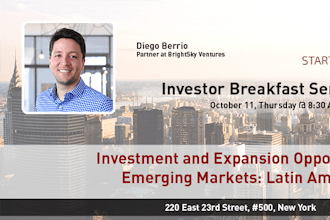Discover the Best Investing Classes in NYC
Have you ever heard the phrase “hedge your bets?” Or maybe someone has reminded you that “playing the long game” is usually better than winning in the short term? These actually began as investing terms. Hedging your bets means being guarded and protecting yourself against risk. Playing the long game means you make strategic decisions for a better outcome in, you guessed it, the long term rather than wins you could probably achieve now that may be short-sighted.
At the most basic level, investing means to spend money on something that will bring you additional income. This is slightly different from the popular term “invest in yourself,” although the concept is similar without money being the primary objective.
Financial investing can feel overwhelming when you begin learning because there are many intricacies, new terminology, and a different view of money than most people have starting out.
When you make an investment, the general goal is to purchase an asset at a low cost, wait until the value increases (appreciation), and then sell it for a profit (realizing capital gains). Risk enters the picture because you, as the investor, decide when to sell to maximize your earnings. If you predict incorrectly, or hold onto an asset for too long, it could depreciate (lose value).
Dividends are the other way people commonly invest. You earn a dividend by purchasing stocks and/or bonds in companies that then pay you a portion of their profit on an ongoing basis.
The primary investment categories are:
- Stocks and bonds
- Mutual funds and Exchange Traded Funds (ETFs)
- Real estate and property
- Commodities like oil that have value outside of currency
When you hear about investing, you probably think of stocks —they’re a pretty common way for people to dip their toes into the investment world. Stocks become available when businesses need capital to grow. They make it possible for investors to purchase shares in the company. The money goes to fund their operations, and in exchange, they pay dividends —or regular earnings —to stockholders. During this process, investors become part owners of the company, which is where risk enters the picture. If a company is doing well, investors make money. If not, they lose money.
Stocks and bonds are often part of the same conversation, but they’re not the same thing. When a company needs to borrow money, they’ll often seek private investors. A bond is formed when a private investor purchases a company’s debt. The investor owns the money, and wipes out the debt, and the company pays the investor back on a “fixed rate of return” similar to a loan payment. The fixed rate of return includes the original amount the investor paid, plus interest. Because of the fixed rate of return, bonds are sometimes considered less risky than other types of investing.
A mutual fund is a company that purchases stocks, bonds, and other securities and creates a profitable portfolio. Investors can buy a stake in the mutual fund and benefit from the portfolio the company has already created —essentially, investors are purchasing stock in a company that already has a portfolio that makes money. Exchange Traded Funds (ETFs) are similar, but include commodities. Because of this, they’re impacted by market values rather than a dollar amount like mutual funds.
Property and real estate are likely familiar terms, too. When investors purchase land, homes, and other buildings, it’s called real estate investment. There are many factors to consider for property and real estate investment. Some include:
- Economy and government in the area
- Growth projections
- Crime rates
- Cost of maintenance and upkeep
If you’re strategic, real estate is often considered a less risky way to invest because land and property are less likely to have big drops in value in a short amount of time like stocks. Property upkeep is a concern for some investors, especially with large or growing portfolios. In this case, Real Estate Investment Trusts (REITs) are a good solution. Like mutual funds, REITs make investments and maintain a profitable portfolio. In return, investors purchase stakes in the REIT, which has added benefits like paying higher dividends and not having to worry about property maintenance.
Commodities are goods that industries use to function —products like lumber, oil, and natural gas. The value of these products is driven by the market values, and positively impacted by inflation rates. When investors purchase commodities, they typically buy using futures, meaning they contract to buy and sell commodities at a set price before the commodities become available. This type of investment is helpful when inflation rises, and is often used to protect against some losses inflation causes; however, it’s quite risky because it means investors are spending based on educated guesses rather than a defined set of circumstances. It’s a more advanced and complex type of investment than others.
Why You Should Learn Investing in NYC
Learning to invest is a great skill to learn no matter where you live. Home to the New York Stock Exchange on “the” Wall Street, learning investing in NYC might be one of the best places in the world to begin your journey.
Aside from the proximity to thousands of professional investors, NYC has a wide variety of reputable schools and classes to choose from. Whether you want to start online for free or attend in-person workshops, NYC has an option available.
People from all over the world flock to NYC because of the opportunity and diversity, which means it’s an amazing place to network and build connections with people who could help you as you learn to invest. It also means you’re likely to meet people you never would have otherwise met, probably from all over the world.
In terms of finances and careers, NYC is full of potential. It’s an expensive place to live, but if you can master investing, you’re more likely to be successful in the city.
In-Person Investing Classes & Schools in NYC
There are many places to learn about investing in New York City. If you’re overwhelmed by the number of choices, try starting your search on CourseHorse. You can search specifically for investing classes in the city, and it will show you schools with in-person classes available, as well as where they’re located.
Wall Street is located in Midtown Manhattan, so it might not be a surprise that there are great investing classes in the area. NYC Career Centers offers a great class for beginners called Stock Market Investing Fundamentals. During this day-long course, you’ll get a foundational understanding of how financial markets work and principles that will help you succeed in the long-term. You’ll learn about topics like financial statements, valuation, and earnings analysis using real-life case studies that fit into the bigger picture.
If you’re looking for a more in-depth and business-oriented class, the American Management Association (AMA) hosts a 5-Day “MBA” Certificate Program. This program is designed for business professionals who need a good understanding of business topics, including investment, as well as practical steps to use their new knowledge. Examples of financial-specific topics include return on investment (ROI), accounting processes, and basic principles of bookkeeping. Since this course is five days, there is plenty of information to get a solid view of how a business looks and functions at a high-level, making it easy for you to determine what to invest in and/or how you want to structure a future business of your own.
NYIM Training offers Financial Modeling Bootcamp in the heart of Midtown. Although financial modeling might initially seem like a separate topic from investing, this 3-day course is actually a great way to prepare for investment analyst positions. You don’t necessarily need to have financial experience to succeed in class, but you will need at least an intermediate understanding of Microsoft Excel. During bootcamp, you’ll learn about topics like advanced Excel for finance, corporate finance, company analysis, corporate valuation, and investment banking interview preparation.
For those who want to pursue a career in finance, Noble Desktop’s Financial Analyst Training Program is an effective way to begin learning. You’ll be surprised by the amount you can learn during this 5-day hands-on program. Start with core Excel skills, building to more advanced functionality before moving on to accounting, corporate finance, and valuation. End the week discussing financial modeling tools and learn how to evaluate potential investment equity from company shares.
Virtual Investing Classes & Schools
If you’re learning from NYC, there’s an undeniable excitement about being in-person around one of the biggest investment hubs in the world. That being said, if you’re not in NYC or you’re simply more comfortable working from your own spaces, there are many online investing classes to choose from.
There are benefits from learning virtually, too:
- Live online and class replays for continued learning
- No fighting through traffic to arrive at class on time
- A larger variety of specialty topics
- Ability to create your own distraction-free learning environment
Although you usually have to provide your own materials for virtual learning, investing classes don’t typically require too many physical resources. You can always inquire with the school or instructor about what you’ll need to be successful in class.
Beginners will benefit from Stock Market Investing Fundamentals live online with NYC Career Centers. They teach the same material in this course online as they do in-person, and the same experts lead the course, which means you’re sure to have a quality class. Walk away knowing the foundations for how to invest wisely for long-term success, as well as basics such as stocks, bonds, stock market valuation, real estate investment.
If you’re familiar with investment basics and want to continue learning, or if you simply enjoy a challenge, Santa Monica College offers an online Investment Bootcamp. During the 2 ½-hour course, you’ll learn how mutual funds, annuities, and retirement plans work. Get practical takeaways for tax strategy and an understanding of how ultra-successful investors like Peter Drucker are incredibly successful. As the course description says, this is a must-take for anyone who has a retirement account.
Private Group Investing Classes in NYC
Want to schedule a personal development or team-building event for your organization? CourseHorse offers private group investing classes that could be what you’re looking for.
Finance Corporate Training offers a solid foundation of corporate financial basics. It’s an excellent way for you and your team to understand how and why corporate finance works to make informed business decisions. It’s a good opportunity to prepare yourself and your employees to move into financial careers, if that’s a goal.
With a fairly small class of up to 20 people, your group will work through real-world case studies of business strategy decisions and current market pricing. Additionally, you’ll walk through ideas like financial terms, financial tools like stocks and bonds, and dividend payments. The class size is perfect for asking questions but still being able to participate in small group discussions.
When booking a class through CourseHorse, there are several helpful advantages:
- Zero booking fees
- 24 hours or less registration confirmation
- Several supported video platforms use for class
- Group customization
- Ability to provide a class for the whole group or vouchers for team members to attend on their own schedule.
If you have questions or want to schedule a free consultation, reach out to CourseHorse via the contact form on their website and they would be happy to figure out the best option for your group.























